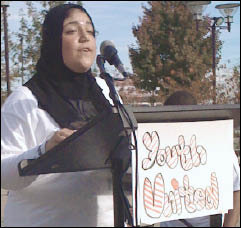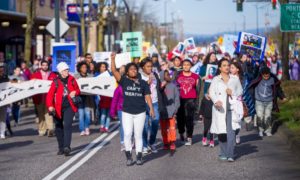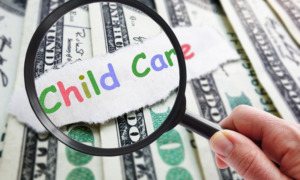 |
|
Speak Out: An Oasis Center youth intern addresses a rally she helped organize against youth violence. Photo: Oasis Center |
Nashville, Tenn.
(615) 327-4455
http://www.oasiscenter.org
Objective: Empower youth to become change agents in their lives and within their community.
In a Nutshell: Youth from area high schools join community action teams dedicated to bringing about positive community and systemic change. They do this through general youth organizing around relevant issues affecting their lives. In the past year, young people have been responsible for planning and leading community conversations, as well as a march, directed at reducing youth violence; providing financial literacy training for middle school students (using a curriculum that they wrote themselves in partnership with Junior Achievement); organizing a youth-led forum for candidates seeking public office; recruiting thousands of youth to participate in a summer employment fair; leading a citywide youth survey and forum for the mayor’s office; and educating and organizing their peers to advocate for a “Student Bill of Rights and Responsibilities.”
Where It Happens: Oasis Center’s Youth Action teams operate out of the Youth Opportunity Center, a building that houses 10 different agencies that serve youth throughout the middle Tennessee region.
When It Began: The Youth Action department formed five years ago. “We recognized the importance of expanding beyond a general youth leadership and development model into a model that engages and trains marginalized youth to directly impact their living environment,” said Deniece Ferguson, Youth Action’s program manager. At the same time the program targets “institutional variables that prohibit predominantly low-income youth of color from successfully transitioning into adulthood,” Ferguson said.
Who Started It and Who Runs It: Oasis Center began 40 years ago, when Nashville citizen Harlan Dodson started the agency as a drop-in center for young people in crisis. Over the past four decades, it has expanded to offer safety and intervention to Nashville’s most vulnerable youth. It also seeks to teach young people how to transform the conditions that create problems for them in the first place.
Hal Cato is the president and CEO of Oasis Center. Ferguson leads the Youth Action department.
Obstacles: Initial challenges for Youth Action were the community’s limited understanding of effective youth-adult partnerships, as well as finding adult partners in Nashville willing to take youth seriously. Another challenge has been getting community organizing partners to hold important meetings at times and locations that allow youth to participate.
How They Overcame Them: “We work very hard to educate our community partners on the value added when youth can participate in meaningful ways in community change work,” Ferguson said. “Adult staff at Oasis Center are committed to bringing our youth partners to the table with us whenever possible.”
Cost: $325,000 a year, including youth stipends.
Who Pays: Principal funding sources are the Cricket Island Foundation, Mary Reynolds Babcock Foundation, Hill Snowden Foundation and Andrus Family Fund. In addition, Youth Action receives local funding from the McLeroy Foundation and Meharry Medical College.
Who Else Has Kicked In: National partners such as America’s Promise and Junior Achievement have partnered with Oasis Center to develop products to share with local and national communities.
Youth Served: The youth participants represent the diversity of Nashville’s residents and have hailed from more than 60 different schools and from homes where 26 different languages are spoken. The youth are high school students, some of whom are home-schooled, while others attend Metropolitan Nashville comprehensive and magnet schools. Right now, 62 youths participate in the action teams.
Youth Turn-On: Ferguson said the biggest turn-on for the students is that their voices are always heard. The youths’ mantra is “no decision about me without me,” she said.
Youth Turn-Off: “Whenever we focus too heavily on concrete workforce skills (i.e. problem-solving, interpersonal communication and time management) that we know transfer to higher employability,” Ferguson said. “Finding the right balance between making sure youth are passionate about changing their environment while simultaneously acquiring hard and soft skills that will help sustain them as they transition into adulthood isn’t easy!”
Research Shows: An internal survey from the fiscal year ended last June showed that 84 percent of the Youth Action participants reported an increase in new, positive community connections, 85 percent reported they understood how to recognize community injustices and inequalities and 87 percent reported having the skills necessary to lead personal and community change.
What Still Gets in the Way: “Our largest barrier is finding external internship opportunities beyond Oasis Center for youth to develop additional skills for community involvement,” Ferguson said. “Once young people have been empowered, they want continual opportunities to plug in and change the world.”































